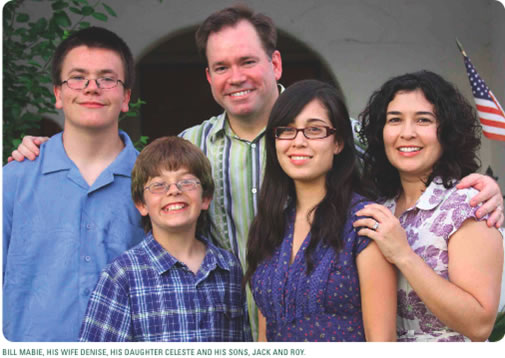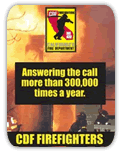Written by Amy Brown
Published Issue: Summer 2008
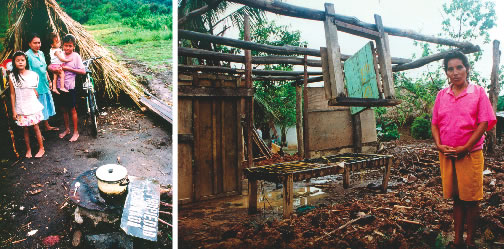
A severe woman was sitting on the other side of the Peace Corps recruiters’ table. She waited for an answer.
“What skills do you have, sir?” she was asking.
Bill Mabie was volunteering to change the world. Weren’t they looking for warm bodies; people prepared to give up their lives for two plus years to help a third world country?
“What skills are you looking for?”
The response was a stack of brochures about agriculture, civil engineering, and fisheries-the skills of survival-nothing he could acquire at a reputable four-year college. Bill kept the one on fisheries and left the table.
Soon, he left the state.
With only three months left to finish a degree in International Affairs from Cal Poly San Luis Obispo, Bill left school to fish in Alaska. He was determined to serve in the Peace Corps. Not everyone, mainly his folks, viewed this as a prudent career path.
Long before Bill Mabie distinguished himself as a senior staff member for former Assembly Member Richard Polanco, long before he ran unsuccessfully for public office against an up-and-comer named Antonio Villaraigosa, and before he took the job as Chief of Staff to Senator Alex Padilla, he had dreams of volunteering in a third world country.
While the promise of travel, adventure, and learning a language was motivating, the opportunity to help people appealed to Bill. The fact that JFK created the Peace Corps gave it allure, but it was an idealistic professor at Cal Poly who inspired him to dream of a volunteer opportunity in East Africa.
In Alaska, Bill learned to long-line halibut and gill-net salmon. He gutted, sorted, bagged, and trucked fish. He did everything from prepping a boat to cleaning up the detritus. He got comfortable on a tough job and after six months, Bill developed a skill.
He returned to Cal Poly to complete his degree. His real motivation was to approach, yet again, the Peace Corps recruitment table.
“What skills do you have, sir?”
It was the same woman...same voice...same severe demeanor.
“I’m a fisherman.”
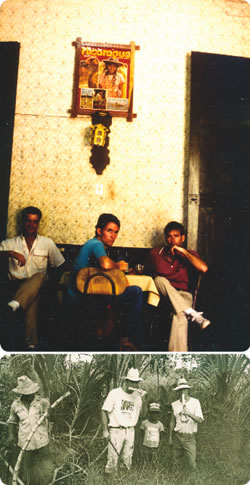 The woman didn’t remember him. She handed him an application and told him he would likely be training in Oklahoma. She knew her business. Her prediction was accurate, and he spent the next three months learning how to design and build aquaculture ponds.
The woman didn’t remember him. She handed him an application and told him he would likely be training in Oklahoma. She knew her business. Her prediction was accurate, and he spent the next three months learning how to design and build aquaculture ponds.
Ronald Reagan created the Kissinger Commission. They released a report calling for massive investment in trade and aid to Central American countries in an effort to encourage political and economic stabilization. They effectively gave the poor no reason to side with Marxist rebels. Part of the assistance package was a large increase in the number of Peace Corps volunteers. The release of the Kissinger Commission recommendation during the processing of Bill’s application resulted in him being sent to Honduras.
Bill’s choice of locations was Tanzania. Peace Corps protocol means sending volunteers to where they are needed the most...and in this instance, Bill was sent to Honduras, the place National Geographic dubbed the ‘Eye of the Storm.’ The storm they were referring to was a maelstrom of violence sweeping through the neighboring countries: Guatemala to the west, El Salvador to the southwest, and Nicaragua to the east. Honduras was by no means a calm center; it was fully engaged in facilitating the counter revolutionary war against its Nicaraguan neighbors and was allowing Salvadoran counter insurgency training within its borders as well.
The Sandinista’s historic victory kicked off a proxy war between the Soviet Union, which was helping Cuba-backed leftists, and the U.S., which was funding rightist allied governments intent on the status quo. In 1979, the unthinkable happened. The Sandinistas removed the U.S. backed dictator, Anastasio Samoza, out of Nicaragua and forced a successful Marxist revolution-second only to Fidel Castro’s Cuba.
A domino had fallen. It became Ronald Reagan’s White House plan to stand it back up. The next year, 1980, the Farabundo Marti National Liberation Front Marxist rebels in El Salvador sought to emulate what had been accomplished by the Sandinistas. They pushed for a final offensive. In response, U.S. funded military activity and paramilitary death squads went into high gear, ultimately claiming the lives of 75,000 Salvadorans. In Guatemala, a genocidal policy against indigenous Mayan Indians and suspected leftists would leave 200,000 dead.
In a remote mountain village, Bill spent time living with a Honduran family. They were loving people. He learned more about the culture and began to master conversational Spanish. After six months of extensive training, Bill, rather naïve and oblivious, was sent out with a little cash and a map of the town he was assigned to serve.
Bill purchased a Yamaha 175 Enduro motorcycle. He rode the country lanes from village to village. He still tells funny stories of barely escaping chickens and pigs in his path. He would ask local farmers if they were raising fish in their ponds-most said no. It was too dry. The viability of aquaculture throughout the region was grim.
Sandinistas chase U.S. backed “contra” soldiers into Honduras directly east of Bill’s town. The Sandinistas are baited into crossing the border in the chase to capture or kill the contras who have been sabotaging their electrical systems and raiding their towns. It is effectively a Central American version of the Gulf of Tonkin incident before the Vietnam War. The U.S. response is quick. Large groups of Chinook helicopters carrying artillery guns and troops fly east over Bill’s town to the border a few miles away. The U.S. military uses one of the local restaurants Bill frequents as its headquarters.
Bill was offered a new site in the North Coast of Honduras. It was the perfect environment for freshwater aquaculture, and he ended up designing, building, and managing a large fish hatchery to supply cooperatives with baby tilapia they could grow in their ponds. Bill’s location became the temporary site of war games involving thousands of U.S. troops. They didn’t stay long. Bill did.
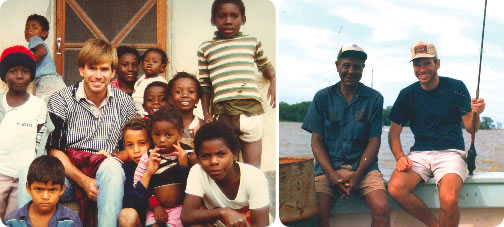
The image of the Peace Corps reaching out to the world in the hope of engendering good feelings is accurate. Kennedy’s beckoning for Americans to make a difference in the world was a clarion call. However, Peace Corps life is grueling-the harsh weather, bugs, the unexpected and all consuming intestinal illnesses are part of the daily travails. Most volunteers look for an escape-a few light moments, and perhaps a few drinks to fog the mind.
There is vacation time made available. Bill took the opportunity to travel with a handful of volunteers around other parts of Central America. They would frequent local watering holes. His favorite was in Guatemala City.
On one particularly hot evening, after several cocktails, someone reached into a bag and pulled out a large ceramic gorilla and put it in the middle of the table. One of the veteran volunteers from the area, who was approaching the end of his service, told a story about the significance of the ceramic primate. Each year a select group of volunteers pass it on to the “freshman class.”
There was respect for the gorilla-and the bond it represented. In the increasingly celebratory mood of the evening, the friends gave praise to the gorilla and to each other.
Bill went back to Honduras. He went out for a beer with a volunteer friend, Wade.
Bill told Wade about the gorilla deity. He admitted to some jealousy that they didn’t have a ritual to fuel the volunteer espirit de corps.
After a few beers, the two left the bar. The stopped at a curio shop-a favorite spot for tourists.
“Pick something.” Wade prompted his friend. “Make it good.”
Bill looked at the books, maps, ash trays, hand woven clothes, and carved wooden machetes. There, sitting on the top shelf in the back corner looking at Bill and Wade was a taxidermied frog. It was beckoning them. Its bulging eyes and lively pose were instantly representational of the ritual Bill had been searching for.
With frog in hand, Bill and Wade began walking downtown. They passed the Maya Hotel, by the woman selling mangos and cashews, by the man with no legs. They bought a mango. They gave money to the legless man.
They accidentally dropped the frog.
“Don’t pick it up, Bill.”
Wade explained that by leaving it on the street and kicking it to the next bar, it could be worn in to look like a piece of history, something worthy of being passed on by the generations.
The frog accompanied Bill and Wade for the rest of the evening. It traveled to each locale by way of ground kicks and knee passes.
When Bill and Wade returned to their hotel, the frog was beaten up, in a condition similar to his new owners. Bill took the frog to the bathroom and washed him off; the mouth had come unhinged and it was filled with sawdust. Bill shook all of the sawdust out of the frog and into the wastebasket. He rinsed the frog out. That’s when Bill realized the frog held water-it was airtight. He describes the frog’s texture as having a similar feel and consistency to that of leather. When the frog was wet, it could be manipulated. When it dried, it hardened.
Bill shared this fabulous news with Wade.
“Hey, the frog holds water.”
“Are you serious? This is incredible.”
They were inspired. The tradition of passing along the frog could now include sharing a liquid content. They even thought of how the frog would fit in a ceremonial cigar box.
Bill and Wade sat on the floor, sharing a last bit of Flor de Cana rum and wrote the following story on a piece of college-ruled, three-ringed binder paper:
“The contents of this box was first christened in Managua, Nicaragua in 1975. It was a cherished friend and symbol to the volunteers of Nicaragua until the fall of the Somoza regime. As Somoza bombed his own capitol, volunteers were evacuated. Those in the west of the country were told to pack light and were smuggled over the border into Honduras. Among the few belongings carried by the small band of dedicated volunteers was this cigar box. In a hasty ceremony before they were sent home to the States, the evacuated Nicaraguan volunteers entrusted this box and its contents to a local Honduran volunteer named Jack. Jack was directed to pass it along to worthy members of the next group of volunteers.”
Some of the details were true.
The story continues:
“He who opens this box must do the following: the contents are to be soaked in water before using. The honored volunteers should have their eyes closed. The item within this box should be filled with rum, and shots shall be taken by volunteers still in their first year of service. The box should then be passed on to them, and they should pass it on to the next group of volunteers. This box and its contents are to be returned to Managua whenever volunteers are invited back into Nicaragua to serve. A return ceremony should take place at the Intercontinental Hotel in Managua and Flor de Cana rum should be used.”
They signed the letter, “Jack.”
Wade and Bill bought a box of Nicaraguan cigars the next day and poured its contents into Bill’s backpack. There was no point in wasting a valuable commodity. They put the dried out frog into the box along with the note from Jack that they dirtied up first by stomping it into the potholes of a grimy side street.
The hours are long for Peace Corps volunteers in the midst of extraordinary violence. Bill Mabie got into a rhythm. He was able to use his skills as a fisherman and a growing expertise in aquaculture to bring some balance to the local economy. It was a job that commanded total attention. Time passes quickly under such circumstances.
A new group of volunteers was expected to arrive. Bill and Wade decided the traditional “ceremony” with the sacred frog should take place the following night.
After work, they took a handful of volunteers out on the town to a series of bars along a popular strip known as the “Guanacaste crawl.” Halfway through their crawl, Wade looked at Bill and nodded.
Bill solemnly presented the cigar box.
“You all are about to share a moment very few Honduran volunteers will ever know,” he said.
Bill then removed Jack’s letter and smoothed out the crumbled paper with the palm of his hand. He read the story. The frog was placed in front of the volunteers. With eyes closed, the volunteers drank rum by tipping the legs of the frog in the air.
The volunteers were transformed into a community. They were all smiling. They were also overwhelmed, surprised the frog still held good booze after so many years.
After several hours of laughing and talking and sharing stories, they decided to call it a night. One of the freshman volunteers took the box with him. It was the last time Bill thought he would ever see the frog.
The unrest in Central America remained steady: Nicaragua sued the U.S. in the World Court, and in June 1986 the Court finds the U.S. guilty of violating international law. A few years later, the U.S. government announces it had been providing military aid to the Contras. The supplies were purchased with funds diverted from the sale of U.S. arms to Iran. The covert operation became known as the Iran-Contra scandal.
Bill left Honduras at the tail end of 1987 to return home. He has never forgotten his experiences in Central America. He is drawn to his past and has returned to Honduras and surrounding countries several times since his service concluded twenty years ago.
On one particular trip, in the early 90s, Bill ran into some volunteers who invited him to a goat roast in the countryside.
That night, Bill found himself sitting in a cinder block house in a small village. The goat, wrapped in banana leaves, had been roasting underground since the previous day, and people were hungry. Bill didn’t know the volunteers but felt a part of the group, talking and sharing stories about his time in the Peace Corps. Around midnight, one of the older volunteers entered the main room of the house. He sat down on a chair and looked at everyone in the room. It was late-only a handful of people still remained. People stopped talking.
“I have something I want to share with this very privileged group of people,” the veteran Peace Corps volunteer said. He reached into his bag and removed a battered cigar box.
Then the volunteer turned to Bill.
“Bill, I am about to share a rare tradition among Honduran volunteers. Since you served your time several years ago, I believe it is acceptable that you remain in the room.”
The volunteer opened the box and removed a piece of paper that was soiled, crumpled, and fringed around the edges. He began reading…
Bill honored the ritual. He drank from the frog. He kept his composure. The pride he felt as a member of the community outweighed his need to burst into uncontrollable laughter.
In 1995, two years after the goat roast, with the Sandinistas out of power, Arnoldo Aleman was inaugurated as President with approximately 49 percent of the vote, thus completing the first democratic and peaceful transfer of the presidency in Nicaragua’s history. The U.S. began sending Peace Corps volunteers back to Nicaragua.
We can speculate that a small group of volunteers arranged a meeting at the Intercontinental Hotel. We can also imagine their difficulty getting through customs with a tattered old box and its strange contents. And when they arrived, we can visualize them sharing the frog filled with Flor de Cana rum. Did this happen? Perhaps. And if it did, we can guess it was an amazing night.
